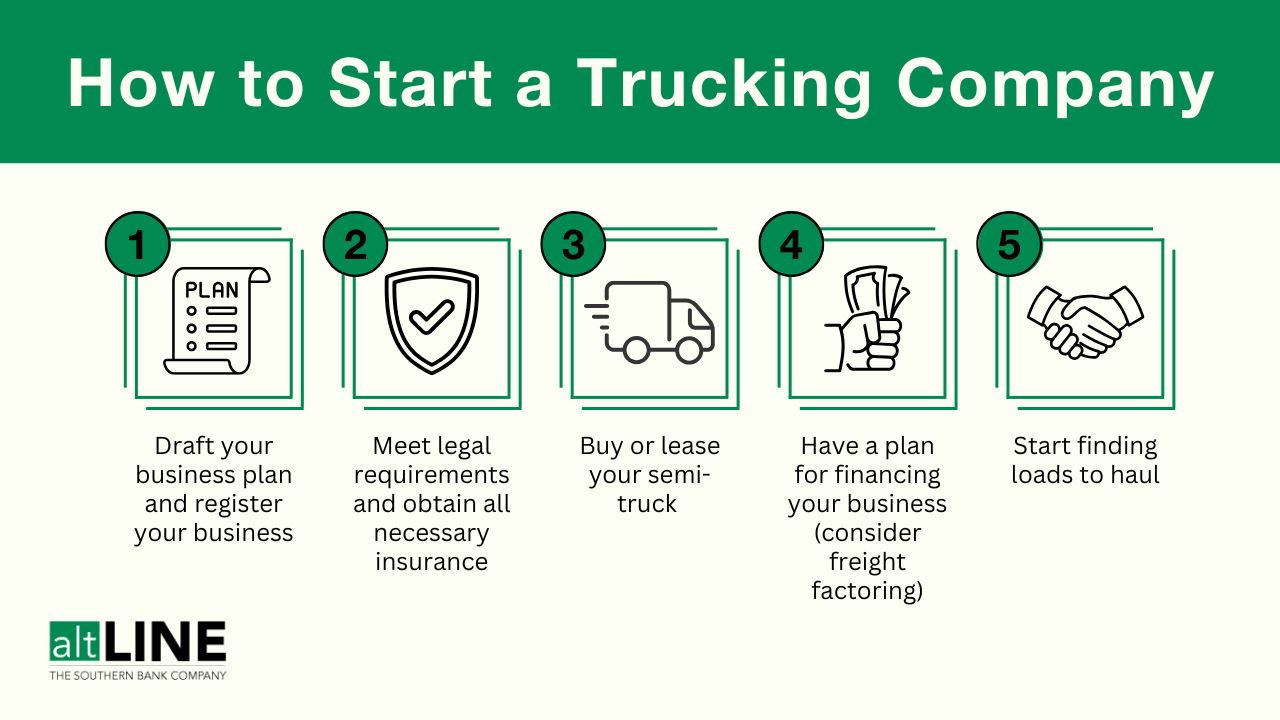Last Updated November 6, 2025
Turn your unpaid invoices into working capital for your business
Starting your own trucking business can be a highly rewarding undertaking. According to Zip Recruiter, the average semi-truck owner-operator in the U.S. brings home $228,575 per year. So with this in mind, it’s no surprise why starting a trucking company is such an exciting venture for entrepreneurs.
But starting and growing a successful trucking company is easier said than done. If not, everyone would do it! You need to have a complete understanding of all of the necessary tactics of running a trucking company to ensure that your investment will not be in vain.
By acquiring the proper resources, gaining an understanding of the current trucking industry, and knowing the steps to take to get your business off the ground effectively, you will optimize your chances of being successful. This guide for how to grow a trucking company can be one of those resources to help guide you through the process.
Key Takeaways
- Trucking businesses can be highly profitable, with owner-operators in the U.S. earning an average of $228,000 per year, but success takes careful planning, compliance, and smart financial management.
- Start strong with a solid foundation by creating a business plan, registering your company, meeting legal requirements, getting insurance, and deciding whether to buy or lease your trucks.
- Keep your cash flow healthy with financing options like freight factoring, which provides quick working capital without taking on debt or needing strong credit.
- Find steady loads and grow fast by using load boards, brokers, and government contracts, while staying on top of accounting, fuel costs, maintenance, and other key expenses.
How to Start a Trucking Company
Starting a trucking business will have to involve meticulous research, brainstorming, and planning. This involves:
- Drafting a trucking business plan
- Determining your business structure and registering your business
- Meeting legal requirements
- Obtaining trucking insurance
- Knowing how to buy or lease a truck
- Understanding common owner-operator expenses
- Managing your accounts, income, and invoices
- Exploring trucking financing options at your disposal
- Knowing how to find loads to haul

With that being said, let’s dive into a more detailed look at how to start and successfully grow your freight company.
1. Draft a Trucking Business Plan
Having a well-crafted business plan is one of the crucial initial steps you need to take when you have a startup company, and a trucking company is of no exemption. The business plan will state essential factors about the business, such as its mission, goal, structure, and a general picture of how the business will operate.
It serves as a road map that you can refer to and know whether you are headed in the right direction. Additionally, you need to have a professional business plan to seek investors, lenders, or partners to offer you financial help.
In order to create your trucking business plan, you’ll need to include the following details:
- Executive Summary and Mission Statement
- Detailed Company Description and Services You Plan to Provide
- A Selected Target Market or Trucking Niche
- Competitive and Market Analysis
- Goal-Planning
- Financial Forecasting
- How You’re Going to Finance Your Company
- Marketing and Sales Strategy
The financial forecasting section is where you show the company’s financial information and its ability to meet its intended goals. The information to include in this section includes:
- Cash flow statements
- Profit and loss statement
- Business balance sheet
- The company’s sales forecast for the next five years
You can also include information on ways you intend to cover costs and generate income for the business, especially before making enough profit to sustain the business.
2. Register Your Business
You’ll need to determine whether your trucking business structure is going to be an LLC, a corporation, partnership, or sole proprietorship. An LLC is a business owned by one (or more) people, a corporation is owned by multiple shareholders, partnerships mean profits are shared among business partners, and sole proprietorships mean the lone founder keeps all the earnings. If you’re planning on being a solo owner-operator, you’ll likely be deciding between an LLC and sole proprietorship.
You can register your business via the SBA.gov website, which also provides additional intel into what information you’ll need to gather and submit, depending on how you choose to structure your trucking company.
3. Meet Legal Requirements
Before you hit the road and officially launch your trucking business, you need to have all legal requirements at hand. Otherwise, you risk always being at loggerheads with the authorities since you’d be running the business illegally.
These legal documents that you need to secure for your trucking company include:
Commercial Driver’s License
Your driver’s license is not valid for use when running a trucking company. Instead, you need to have a commercial driver’s license. The same case applies to the drivers that you hire; they need to have commercial driving licenses.
To apply for this license, you need to be above 21 years, have a valid social security number, and prove US residency. To qualify for the license, you need to pass knowledge exams, vision exams, and complete a pre-trip inspection and road skills test.
Related: Requirements for a Driver Qualification File
Trucking Authority
A trucking authority is a permit that you receive from the government to get paid to transport goods across state lines. This permit is also known as operating authority or motor carrier authority, and enables you to choose your routes, schedules, and goods to carry without any restrictions.
Process Agent
A process agent acts as the link between the state and the business. In most states, as required by law, each business should have a process agent. The agent should be present at a physical address to receive and sign documents such as wage garnishments, tax documents, legal notices, and state mandates.
Other legal requirements and permits you may need to obtain for your trucking business include:
- USDOT and Motor Carrier Authority numbers
- International fuel tax agreement
- BOC-3
- 2290 tax forms for heavy vehicle use regulation
- Standard carrier alpha code
- International registration plan
- Unified carrier registration
4. Obtain Trucking Insurance
You’ll need to set aside some money for trucking insurance. The insurance will protect the business in case of unexpected financial risks and cover expenses incurred in accidents.
Typical owner-operator insurance requirements include:
- Workers compensation insurance
- Commercial general liability insurance
- Commercial auto liability insurance
- Cargo insurance
- Physical damage insurance
- Uninsured motorist insurance
- Non-trucking liability insurance
- Bobtail insurance
Make sure to check out and compare different insurance coverage providers so you make sure that you end up with a reliable provider with good rates.
5. Buy or Lease Your Semi-Truck
One crucial factor to consider when contemplating starting a trucking company is how to obtain a truck. There are two main ways through which you can acquire these trucks: buying and leasing.
If you have enough funds, it is best to buy a new truck that has not been used before. Be careful not to compromise on quality when trying to save cost. On the other hand, if you must buy a used truck, check all necessary considerations to ensure that the truck is worth your investment.
If buying a used truck, keep an eye out for:
- Rust
- The truck’s oil change history and maintenance
- Signs of body damage
- Tire tread
- The truck’s mileage
If you decide to lease the trucks for your business, have clear terms of service with the person leasing it. Additionally, ensure that they have a reasonable leasing cost to not spend all your profit on leasing the truck.
You may want to buy or lease a truck, but not have the immediate funds. That leads us to the next step.
6. Explore Trucking Business Financing
Even if you have what you think is enough funds to build your company, there’s a good chance you’ll reach a point where you want to expand operations and ultimately realize additional financing would be helpful.
Whether you’re launching your trucking company with no money or you have hundreds of thousands in savings, it’s important to look into trucking business financing. One of the most common funding options in the industry is freight factoring.
Freight Factoring
Freight factoring is a rare form of financing that doesn’t require you to sacrifice hard assets.
If you’re unfamiliar, freight factoring is the process of selling your unpaid broker or customer invoices to a third-party factoring company (“factor”) in exchange for a cash advance. Freight factoring provides an immediate working capital boost for owner-operators who need it. It also helps keep improve cash flow thanks to funds from invoices flowing into businesses in a much more reliable, consistent fashion.
The best part about freight factoring? Even owner-operators with a lack of credit history or subpar credit can qualify. Factoring companies care more about your customers’ background and payment habits than your own, since your customers will be the ones owing them payment. Plus, no collateral is involved aside from the invoice itself.
If you’re looking to expand your business operations or you’re in a period of negative cash flow, it’s worth looking into freight factoring. It also prevents you from having to take on added debt, since factoring isn’t considered a loan.
7. Find Loads to Haul
Before you begin operations, it’s crucial to have a strategy in place to find loads to haul. Some of the most common methods owner-operators utilize to find loads and build out their schedule include:
- Online Load Boards
- Dispatch Services
- Government Contracting
- Using a Freight Broker
- General Networking
Load boards are essentially an online marketplace, making it easy for any trucking business owner to find business.
Third parties like dispatch services and freight brokers can be incredibly helpful, though they’ll come at a cost.
A simply way to find loads to haul for your new trucking business is by becoming a government contractor. This is a simple way to be granted access to a plethora of loads, however it can get competitive, and the payment process can be a bit more complex than working with a broker or standard customer.
Finally, a good tip is to always prioritize making time to network, whether that’s by exploring LinkedIn, attending local or national conferences, joining webinars or seminars, or reaching out to your existing connections. You might be surprised at how simply putting your name out there and meeting people in the industry can lead to new business opportunities.
8. Learn How to Manage Your Receivables
Most startup businesses fail because of cash flow problems. Because of this, 44% of small business owners have set up an invoice payments service to help manage cash flow, while 45% use accounting software to assist with managing cash flow.
Therefore, to keep the business running, take control of all accounting tasks in the business. This includes knowing how to properly manage payments received (accounts receivable), payments sent (accounts payable), your income, and your business budget. In addition, be prepared to handle the most common expenses for trucking business owners, such as:
- Fuel
- Insurance
- Employee salaries
- Buying (or leasing) a truck
- Licenses, permits, and registration
- Truck maintenance
- Taxes
- Load board fees (if applicable)
- Accounting software
- Payroll (if you hire employees)
Freight factoring can be a huge help for trucking businesses that don’t have an experienced, dedicated accountant on staff. Furthermore, automating where possible can be a huge time-saver.
Interested in Factoring?
Turn your unpaid invoices into working capital so you can keep growing your trucking business.
In-Summary: How to Grow a Trucking Company
Starting and running a trucking company may be difficult, but it’s certainly not impossible. By utilizing the right tips and tools, it won’t take long to start finding your first loads to haul and bringing in some serious revenue. And while you will be posed with challenges, using the cheat sheet above can help you avoid common slip-ups made by new owner-operators, already giving you a leg up on many of your competitors.
Starting and Growing a Trucking Business FAQs
How much does it cost to start a trucking company?
Startup costs for a trucking company are around $26,000. However, this number can vary greatly. For example, if you choose to buy a truck rather than lease a truck, that number will be significantly higher, as buying a semi-truck costs $80,000 to $150,000. Plus, you’ll have to account for operating costs.
Ultimately, you should have at least $15,000 to $30,000 in your pocket when first launching your trucking business.
Can you start a trucking business with no experience?
Yes, while you can start a trucking business with no experience, you’ll be required to meet several legal obligations. If you plan on driving your truck yourself, you’ll need to obtain a Commercial Driver’s License, which can take four to eight weeks. Otherwise, you’ll need to hire licensed drivers. Additionally, it’s crucial to learn the ins and outs of the trucking industry before entering the field yourself.
How do you register a trucking business?
To register your trucking business, you’ll need to head to the Federal Motor Carrier Safety Association (FMCSA) website to ensure you meet all safety requirements, get your MC Number (Operating Authority), and determine other potential FMCSA needs/requirements that you must meet. Then, you can register your business with the U.S. Small Business Administration, which is a more general procedure required for businesses across all industries.
How long does it take to start a trucking company?
Starting a trucking company can take anywhere from a few weeks to months. You can get your Operating Authority within 20 days of applying with the FMCSA, but there remains other requirements to start a trucking company that will require some significant time on your end. Ultimately, the exact time it takes to start your trucking business will depend on your efficiency with meeting all requirements. However, it’s important to not rush, so you don’t miss any necessary steps along the way.
What do you need to start a trucking company?
To start a trucking company, you’ll need:
- Executive Summary and Mission Statement
- Detailed Company Description and Services You Plan to Provide
- Target Market or Trucking Industry Niche
- Competitive and Market Analysis
- Goal-Planning
- Financial Forecasting
- How You’re Going to Finance Your Company
- Marketing and Sales Strategy
Grey was previously the Director of Marketing for altLINE by The Southern Bank. With 10 years’ experience in digital marketing, content creation and small business operations, he helped businesses find the information they needed to make informed decisions about invoice factoring and A/R financing.









